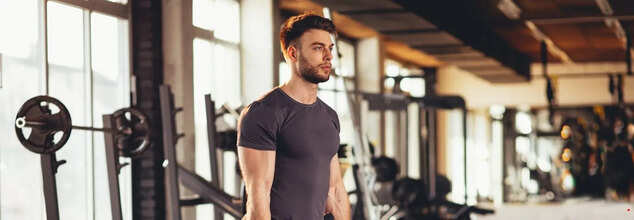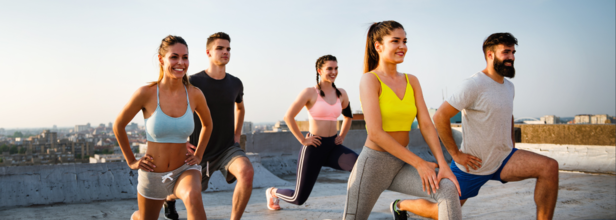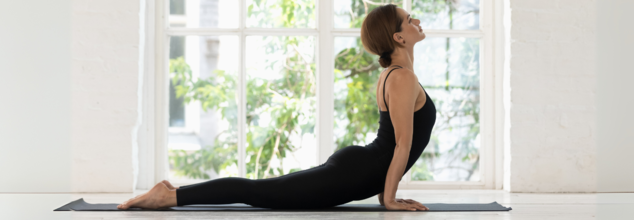
Credit: Canva
Your Ultimate Guide To Getting Started With Kettlebell Workouts Is Here-Check It Out
Kettlebell workouts have gained immense popularity due to their ability to enhance strength, endurance, and flexibility. If you're new to weight training or looking to diversify your routine, kettlebells offer a dynamic and effective way to improve overall fitness. Here’s a beginner-friendly guide to help you get started safely and effectively.
Choose The Right Kettlebell
Start with a lighter weight to master form—typically 8-12 kg for women and 12-16 kg for men. As you build strength and confidence, you can gradually increase the weight.
Warm Up
Perform dynamic stretches and light cardio for 5-10 minutes to increase blood flow and prepare your body for movement. This reduces the risk of injury and enhances workout performance.
Master Basic Moves
Before advancing to complex exercises, focus on these foundational kettlebell movements:
Kettlebell Swing: Powerful hip thrusts and proper form are key. Keep your back straight, engage your core, and generate power from your hips.
Goblet Squat: Hold the kettlebell at chest level and squat down while keeping your chest up. This movement strengthens the legs, core, and lower back.
Kettlebell Clean: Lift the kettlebell to shoulder height in a controlled motion, keeping it close to your body to avoid strain on the wrist.
Kettlebell Press: Engage your core and press the kettlebell overhead, ensuring stability and control throughout the movement.
Focus On Form
Maintaining correct posture and technique is essential to prevent injuries. Always keep your back straight, engage your core, and avoid excessive strain on the joints. If unsure about form, consider seeking guidance from a certified trainer.
Start Slow
Begin with 2-3 sets of 8-12 repetitions per exercise. Instead of rushing into heavier weights, focus on perfecting technique before increasing intensity. Over time, you can adjust your routine by incorporating more challenging variations or increasing resistance.
Cool Down
After completing your workout, dedicate time to stretching major muscle groups to enhance flexibility and prevent stiffness. Hydration is also essential for muscle recovery and overall performance.
Rest And Recover
Allow at least 48 hours between kettlebell training sessions to give muscles adequate time to recover and grow stronger. Recovery is key to preventing injuries and ensuring long-term progress.
Final Thoughts
Kettlebell training is a highly efficient way to build strength and endurance while promoting functional fitness. By following a structured approach—starting with the right weight, mastering form, and incorporating rest—you can safely integrate kettlebells into your fitness routine for long-term benefits. Listen to your body and progress at your own pace to ensure a sustainable and injury-free workout experience.

Credits: Canva
These Are The Top 10 Fittest Cities Of America
There are many cities in the United States, however, not all of them are fit. In fact, the prevalence of obesity among adults aged 20 and older in the US was 40.3%. Severe obesity has affected 9.4% of adults, notes the Centers for Disease Control and Prevention (CDC). This is why the American College of Sports Medicine's (ACSM) 2024 American Fitness Index analyzed and ranked the 100 largest cities the United States to assess cities' overall fitness. The index was based on 33 fitness indicators. It considered factors like fruit and vegetable consumption, exercise habits, overall personal health, access to parks, playground, and recreational centers.
The ACSM ranked these 10 cities as the fittest of all
10. St Paul, Minnesota
At number 10th, we have St Paul. It was a population of 303,176 and has the most baseball diamonds per 10,000 residents of the 100 cities included in the report.
9. Irvine, California
This is a city in Orange County, which has ranked at the 9th for the US fitness index. It has a population of 313,685 and around 79% of the residents have exercised previous month. Out of them, 57.2% have also met the guidelines set for aerobic activity as per the American College of Sports Medicine and the CDC.
8. Atlanta, Georgia
Atlanta also joined the top 18 list at number 8 position with a population of 499,127. The city also performs well in regard to its citizens' health behaviors, with a high percentage of residents exercising in the last month. The citizens here also ranked highly for living within 10-miunte walking distance to a park.
7. Denver, Colorado
At seven, we have Denver, with the population of 713,252. It has also performed well with citizen's healthy behavior. 81.5% of its population exercised in the previous month.
6. Minneapolis, Minnesota
Second time in a row we have Minnesota, with its city Minneapolis at rank 6. It has a population 425,096. It is also in the index' highest ranked city for Bike Score, which measures whether a location is good for biking based on its bike infrastructure, geography and share of bicyclists. The city also ranks high for having parks within a 10-minute walk and for having a high percentage of residents who have exercised in the previous month.
5. Madison, Wisconsin
It has a population of 272,903 and the residents are mostly in good shape, reveals the survey. 55.1% of its residents are in excellent or very good health and 84.7% of its residents have exercised in the past month.
4. San Francisco, California
California is also making its mark the second time on the list. This time, it is with its 4th fittest city with the highest-ranked walk score among the 100 cities analyzed. It has a population of 808,437 and is the city with the lowest obesity rate. The rates are at 15.8% and 99% of its residents live within 10-minute walk to a park.
3. Seattle, Washington
It has a population of 749,256 and it prioritizes well-being. This is why it has earned the highest personal health ranking, which examines what people are doing individually to get and stay healthy.
2. Washington, D.C.
It has a population of 671,803. The city ranks first for the percentage of its population that consumes two or more fruits a day.
1. Arlington, Virginia
The first one to top the list is Arlington. This is for the seventh time in the row that Arlington has been ranked the fittest US city as per the American Fitness Index. It has ranked in top 10 in the 16 out of the 33 indicators. It has a population of 234,000. It has ranked best among the community and environment category, including for people exercising in the precious month, people sleeping 7+ hours a day, and the percentage of residents who smoke or live 10-minutes away from the park.

(Credit-Canva)
Not Just Gym These Yoga Poses Can Build Your Arm Strength Too
When it comes to building arm strength, people instantly turn to gym and strength training first, but there's another way to get strong- yoga. Yoga is a great way to build arm and shoulder strength, and you don't need any weights. Instead, you use your own body weight to make your muscles stronger, just like you do with weights. Plus, yoga gives you other good things too, like better flexibility, more energy, a calm mind, and better focus. So, if you want to get strong arms and shoulders without lifting weights, yoga is a great choice.
Plank Pose (Phalakasana)
Imagine holding a straight line with your body, like a board. This pose makes your arms, shoulders, and wrists strong. It also helps your belly and back muscles. You start on your hands and knees, then move your feet back and hold steady. Try to keep your body straight for about 30 seconds.
Side Plank Pose (Vasisthasana)
This is like a regular plank, but you do it on your side. It's great for making your arms and the sides of your body strong, and it's easier on your back. You start in a plank, then turn to one side, balancing on one hand and foot. Hold for 12-15 seconds, and then do the other side.
Dolphin Pose (Ardha Pincha Mayurasana)
This pose uses your forearms to build arm strength. You start on your hands and knees, then put your forearms on the floor and lift your hips up. Your body will look like an upside-down "V". Relax your neck and hold the pose for a few deep breaths.
Upward Plank Pose (Purvottanasana)
This pose lifts your whole body off the ground, which makes your arms and shoulders very strong. You sit with your legs out in front, put your hands behind you, and push up with your arms and feet. Hold this pose for a few breaths.
Three-Legged Dog Pose (Eka Pada Adho Mukha Svanasana)
This pose makes your arms stronger and stretches your back and legs. You start in downward-facing dog, which looks like an upside-down "V", and then you lift one leg up high. Hold it for a few breaths, and then do the other leg.
Upward Facing Dog Pose (Urdhva Mukha Svanasana)
This is a backbend that strengthens your arms and stretches your chest and belly. You lie on your stomach, put your hands under your shoulders, and push up, lifting your chest and thighs. Breathe deeply and hold the pose.
Cobra Pose (Bhujangasana)
This pose is similar to the upward-facing dog, but it's easier on your shoulders. You lie on your stomach, put your hands under your shoulders, and push up, but keep your elbows slightly bent. Hold the pose for a few seconds and breathe.
Bow Pose (Dhanurasana)
This pose stretches your whole front body and makes your arms strong. You lie on your stomach, bend your knees, grab your feet with your hands, and lift your chest and thighs. Hold the pose for a few deep breaths.
Cooling Down and Relaxation
After doing these poses, it's important to let your body relax. You can lie still on your back in Corpse Pose, or rest in Child’s Pose, which is especially good for stretching your arms and releasing any tension.

(Credit-Canva)
7 Animal-Inspired Yoga Poses And How They Affect Your Health
Yoga is one of the most inclusive exercises one can try. Whether you are a professional athlete or a beginner, yoga can accommodate all levels and help people lead a healthier life. One unique thing about yoga is that it draws from everything around us. It is adaptable and helps you in various ways. For example, despite originating hundreds of years ago, yoga, when desks jobs were not even a concept, today we have desktop yoga poses that help people who spend prolonged hours sitting.
Yoga draws from nature and helps us stay connected to all the living beings. Drawing inspirations from animals and their way of living, there are many animal-inspired yoga poses that help us a great deal. Not only do these poses help us heal our body, but it also allows us certain moments in the animal’s state of being. Here are some animal-inspired yoga poses you can try. Make sure you do them very carefully and cease any more exercising in case you are feeling any discomfort or pain. Following a professionals guide as to what breathing pattern you should follow and how to execute the yoga pose can really help.
Butterfly Pose (Baddha Konasana)
This seated pose gently opens the inner thighs, hips, and groin, boosting flexibility. It can also tone the lower body, improve digestion, and alleviate back pain by stretching and engaging lower back muscles. This pose is particularly beneficial for women's reproductive health.
Cat-Cow Pose (Marjaryasana-Bitilasana)
This dynamic flow warms up the spine, releasing tension in the back and neck, and enhancing posture and balance. It increases spinal flexibility and strengthens surrounding muscles. Additionally, it massages and stimulates abdominal organs, and provides relief from back pain.
Cobra Pose (Bhujangasana)
This rejuvenating backbend opens the chest, shoulder blades, neck, and collarbones. It improves spinal posture and reduces stress. By enhancing blood circulation, it can also alleviate back pain and inflammation related to chronic conditions. Furthermore, it can contribute to a better sleep cycle.
Fish Pose (Matsyasana)
This pose offers both physical and mental benefits. It opens the chest, shoulders, and throat, counteracting the effects of prolonged sitting. It stretches chest muscles, improving lung capacity and oxygen intake. It also relieves tension in the neck and shoulders.
Downward Dog Pose (Adho Mukha Svanasana)
A staple in many yoga sequences, this pose builds core strength and provides a full-body stretch, strengthening muscles in the arms and legs. It's excellent for bone strengthening, spinal tension relief, and overall flexibility improvement.
Camel Pose (Ustrasana)
This backbend stretches the entire front of the body, including the chest, abdomen, and quadriceps, while improving spinal flexibility. It stimulates abdominal and neck organs and aids digestion. It also strengthens quadriceps and tones glutes, but those with sensitive knees should exercise caution.
Eagle Pose (Garudasana)
This pose enhances balance, coordination, and concentration by engaging multiple muscle groups. It stretches the shoulders, upper back, and thighs, promoting flexibility and mobility. It also fosters calmness and focus, reducing stress and anxiety while improving mind-body awareness.
© 2024 Bennett, Coleman & Company Limited

